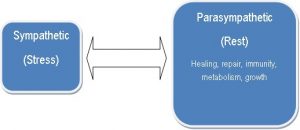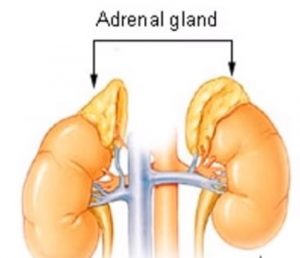There are multitudes of studies associating persistent pain with various life stresses. Did my grandma not have stress during her childhood and adult life? She certainly did as her childhood was during the great depression; she lost her husband suddenly at a young age and was a single mother of 4 in a small village with great poverty while experiencing religious persecution. Years later with the war in Iran, she escaped with her family where she had to adopt to her new home in Canada without speaking a word of English.
What was it about my grandma that she lucked out and never developed persistent pain or a sensitized nervous system despite her ongoing life stresses? Genetics perhaps?

We can safely say that one does not have to have a stress-free life in order to be pain-free as many who have had significant stresses in their lives, will not ever develop persistent pain (e.g. my grandma).
The opposite of stress is not being stress-free but having control in life. I hypothesize that my grandma has had amazing coping skills where she felt in control no matter what happened in life.
We are all on a continuum between sympathetic (fight or flight) and parasympathetic (rest and digest) systems and we spend most of our life somewhere in the middle of the continuum.

The risk of development of persistent pain is sometimes related to spending too much time in the sympathetic end of the continuum negatively influencing cortisol levels in the body.
The release of cortisol by the adrenal glands is a natural part of the sympathetic stress response. Acute stress is inevitable and cortisol release during acute stress is in fact a positive physiological response; however repeated and chronic unmanaged stress results in the eventual exhaustion of the adrenal glands resulting in hypo-cortisolism or reduced cortisol levels.

Chronic hypo-cortisolism has been associated with new-onset musculoskeletal pain and with various chronic pain conditions such as fibromyalgia, chronic pelvic and low back pain, sciatica and TMJ disorders.
Cortisol has the job of regulating glucose metabolism as blood glucose needs to be high during stressful events to provide fuel for the nervous system. However, if cortisol levels remain low during chronic stress, blood glucose will remain low leading to fatigue and stress on the nervous system, increasing pain sensitivity.
In summary, acute stress is inevitable, prolonged or exaggerated response to stress may intensify sympathetic nervous system activity that may eventually exhaust cortisol levels leading to widespread inflammation and pain hypersensitivity
Although a stress-free life is not realistic, we all have the capacity to control what we perceive as stressful and how we respond to it. Somehow my grandma managed to deal with all her life stresses and remain in control without any mindfulness-based interventions or cognitive behavioural therapy.
Anyone who meets my grandma immediately notices her frequent laughter and most often for no reason. Perhaps laughter is the best medicine!


